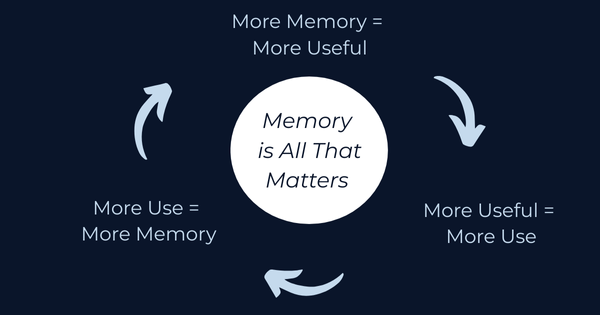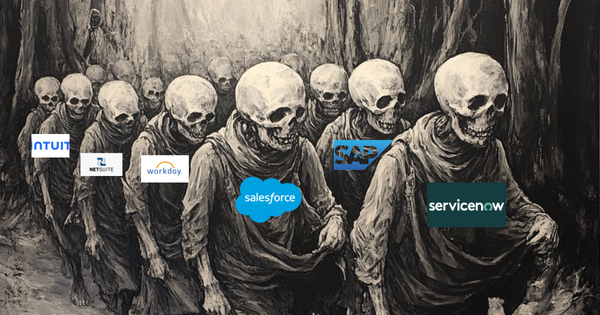AI is Automating Jobs: Now What?
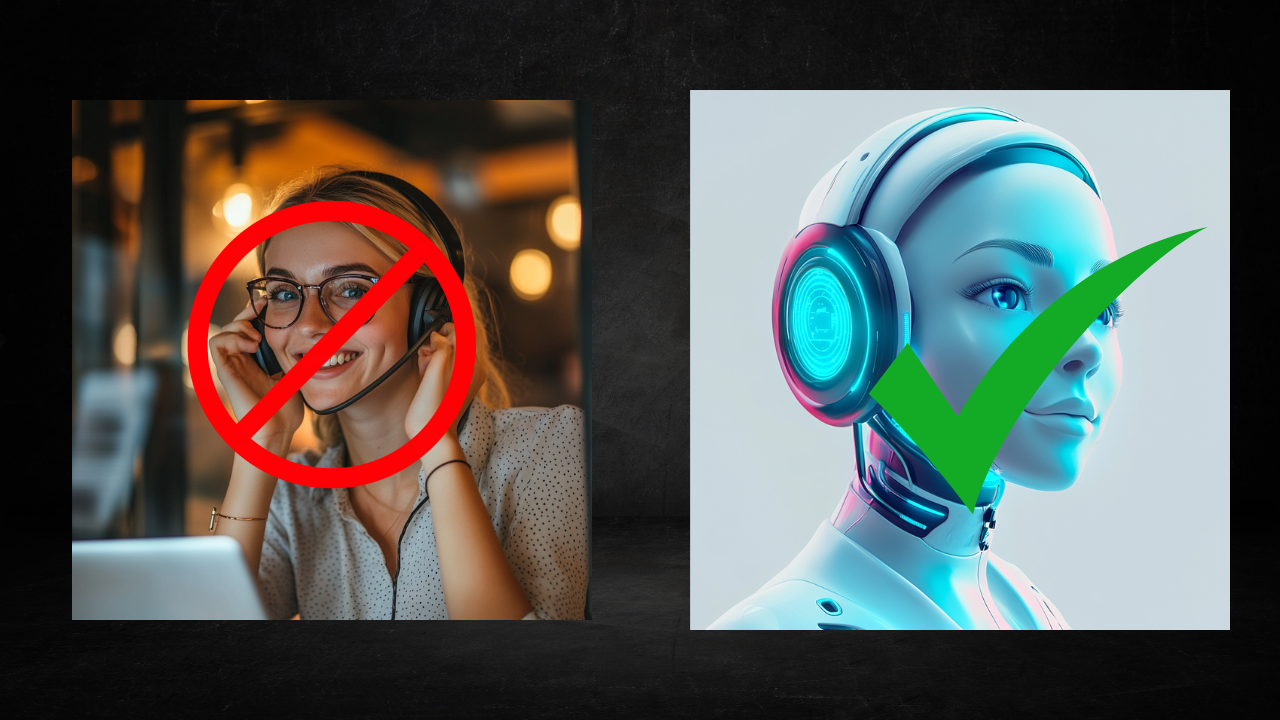
AI is already automating jobs.
We used to need a person to translate…Now AI can do it:
We used to need a person to drive a cab …Now AI can do it.
We used to need a person to provide customer service…Now AI can do it.
We used to need a person to provide personalized nutrition advice…Now AI can do it.
These are just a few examples of many.
And the pace of change is not slowing down.
It’s accelerating.
Over the next decade many jobs will be automated out of existence.
And many organizations will be too.
That’s the bad news.
The good news is that the AI revolution will also bring more opportunity than the world has ever seen.
And those that know how to position themselves can not only survive, but thrive.
So what should you do?
First, heed the lessons of the past.
This will not be the first time a huge percentage of jobs have been automated.
The Industrial Revolution brought a similar change to what we are about to see.
Prior to the industrial revolution the large majority of the population worked in agriculture.
Today less than 2% does.
The majority of manual farming jobs have been lost forever.

But they were replaced with better and higher paying jobs that are all around us today.
What’s the primary lesson here? Embrace the change.
You want to know how to use the tractor of our times.
Yes, this puts you in the best position to have a job riding the tractor.
But there is a much more important reason:
Using the new technology enables you to see the new opportunities it brings with it.
The farmers who first used the tractor, were given a front row seat to all the other opportunities it represented.
Things like manufacturing all the components of the tractor.
Mechanic shops.
Tractor sales facilities.
Gas stations.
Tractor supply companies.
And the list goes on and on.
The same will be true with AI.
Those that start using AI in their work and day to day lives will be in the best position to see (and take advantage of) all the new opportunities it represents.
And those who do not, will be left in the dark.
Second, understand what’s different this time.
The transition is happening much faster this time.
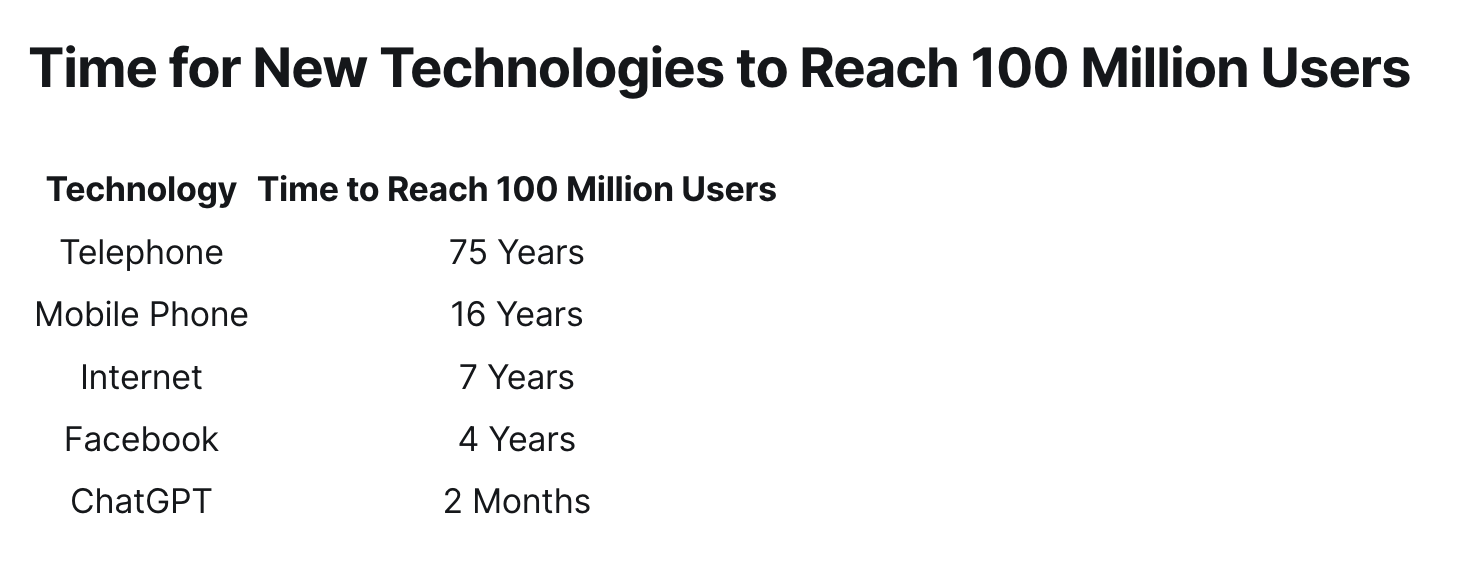
Past technological revolutions played out over decades.
Even the internet took years to significantly affect people’s day to day.
The infrastructure needed to be built.
Having a computer was expensive and had a significant learning curve.
Use cases in the early days were limited.
This time it’s different.
Much of the infrastructure is already in place.
We all have the computers and smartphones needed to access it.
AI is free to use.
The use cases are everywhere.
And the learning curve is non existent.
Just open up the app and start chatting with it like you would a human.
You can even ask the AI how to use it for god sakes!
This is why massive change is going to take place over the next few years vs the decades it took previous revolutions to unfold.
What individuals should do:
Start using AI in your work and day to day life.
The easiest route to start is to download and start chatting with ChatGPT on your computer at ChatGPT.com and/or by downloading the free app on your phone.
It’s not only the easiest AI tool to use.
But it’s also one of the most powerful.
And best of all it’s free.
So how do you use it?
Think about it this way.
You’ve just been given a personal assistant.
This personal assistant is really good at some things.
And really terrible at other things.
How would you know what your assistant is really good at and what they are really bad at?
You’d start asking them to do things where the stakes are low.
And see what happens.
And you should do the same with AI
Need the answer to a question?
Ask ChatGPT, see what it says.
Need advice on negotiating a raise with your boss?
Ask ChatGPT, see what it says.
Want help planning your next vacation?
Ask ChatGPT to help you, see what it says.
Want to know if AI can help you with a task?
Tell ChatGPT what the task is, ask it to help you, and see how it does.
If it does a good job doing what you ask, great, keep using it for that.
If it does a bad job, then provide feedback just like you would to a human personal assistant, and see if it improves.
If it doesn’t then don’t use it for that task, for now.
Every month AI gets a little bit better, and some months it gets a lot better.
So come back periodically and see if your assistant has improved enough to help you with the tasks it failed at in the past.
Millions of other people are also using AI as their personal assistant.
Seek them out in your town.
At work.
And online.
Share ideas and ask them how they are using their AI assistant.
But be careful with your personal information.
The more AI systems know about you the better they will be at helping you.
But there’s an issue.
These systems are basically digital brains.
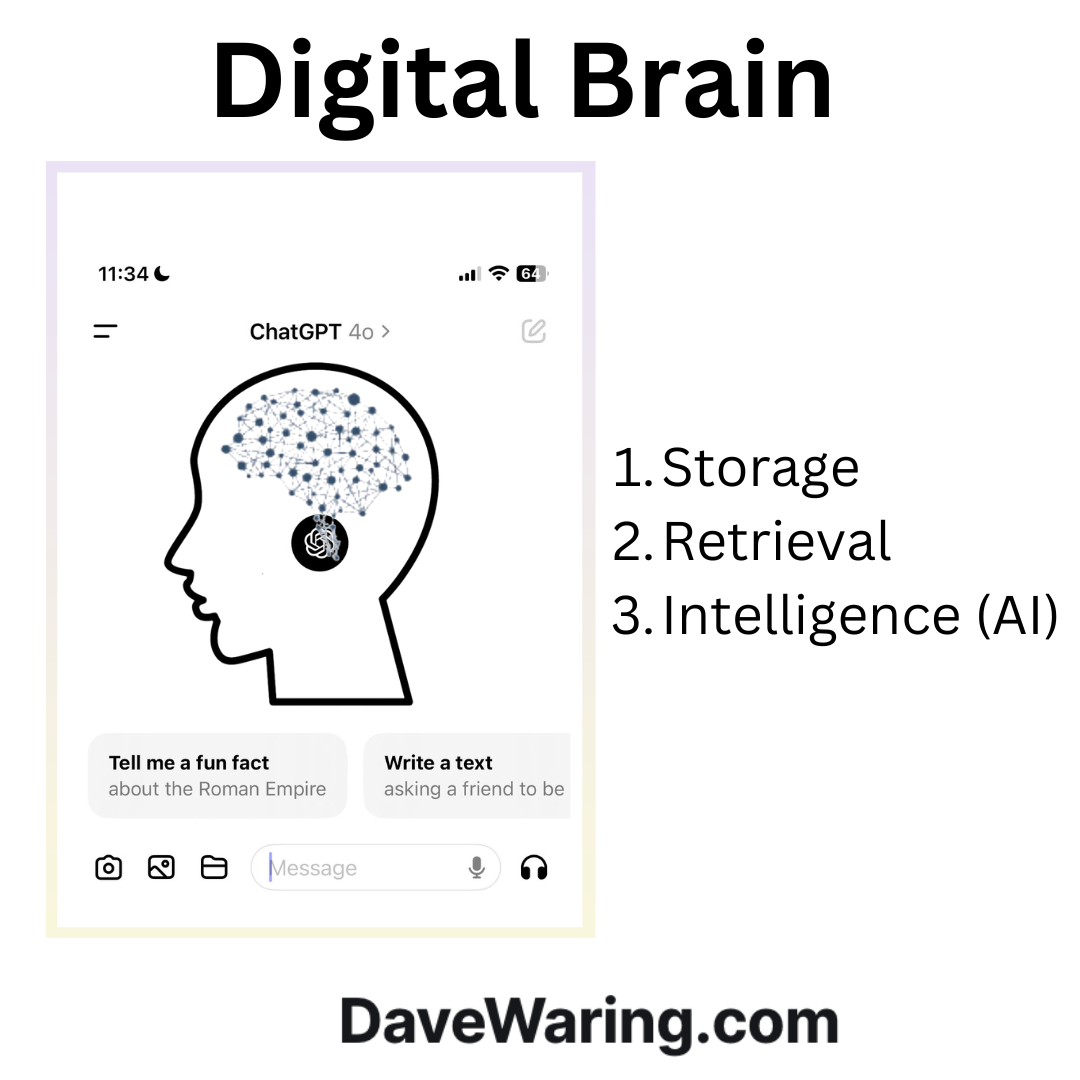
And the more personal data you feed them the more they become your digital brain.
And you don’t want ChatGPT or any other company to own your digital brain.
You want to own it.
You want to keep your private information private.
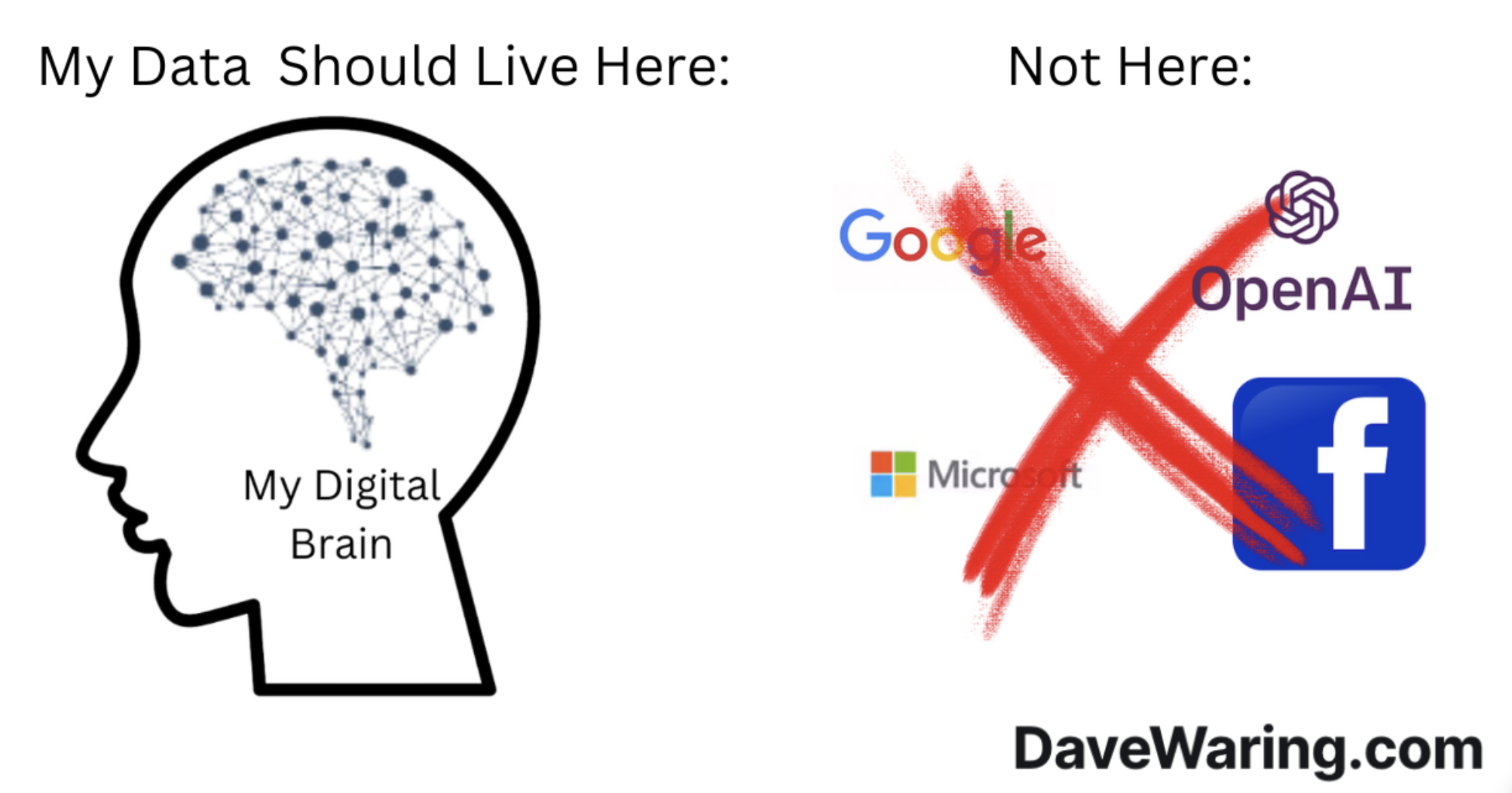
And you want to start building a unique knowledge set in your digital brain.
Just like you have in your physical brain.
A knowledge set that allows you to provide value to others.
And earn a living from your digital brain in the future.
Just like you earn a living from your physical brain today.
So when you are ready to feed AI your personal information, you should stop using ChatGPT, and start using your own AI powered digital brain instead.
That’s what I help you do over at DigitalBrainBase.com, so come say hi when you are ready.
What businesses should do.
If you could give yourself and every one of your employees a personal assistant for free, would you?
I imagine the answer is yes.
But probably not all at once.
You’d probably give a few to your best and most trusted staff.
Ask them to use their assistants for low stakes tasks.
And to share their results with you and the other team members in your testing group.
And then once you have a good idea on what the assistants are good at and what they are not, start giving them out to the rest of your team.
And that’s what AI systems like ChatGPT are.
So what’s the best way to get your team up and running with their new personal assistants?
Ask your most trusted employees to start using them for low stakes tasks.
See how they do.
And then ask the team to share their successes and failures.
Start integrating the things that the assistants are good at into the business for all employees to use.
And then come back in the future to try the things that didn’t work, so as they improve you’re the first to know.
But be careful with your businesses private data and proprietary knowledge.
Ensure that your team is clear that no customer information should be shared with the system.
And that they hold off on feeding the system any proprietary knowledge that gives your company a competitive advantage in the market.
There are plenty of ways to use ChatGPT without doing this.
And once you are ready, you can set up a private AI powered digital brain for your company.
An AI powered system that ensures private customer data remains private.
A system where you can store proprietary data sets and build a knowledge base that is unique to your business.
A digital brain that gives your company distinct advantages that can’t be obtained through tools like ChatGPT.
And that not only maintains your company’s edge in the AI powered future, but sharpens it.
(We focus on individuals at DigitalBrainBase.com but our guides can help businesses think about this as well).
What does this mean for young people?
The Industrial Revolution automated much of our manual labor.
Now, the AI revolution will automate much of our cognitive labor.
This means our children's lives and work are going to be very different from those of the past.
During their lifetime, AI is going to take over more and more of the work that is done behind a computer.
The more systematized and technical a job is, the more likely it will be done by AI.
Perhaps counter-intuitively, this means it is our children's non-technical skills that will allow them to thrive in the AI revolution.
What I refer to as emotional labor.
Unfortunately, much of our current education system is designed to educate a workforce that would be doing well-defined jobs with well-defined career progression.
Our children are taught in a standardized way for standardized work.
These are the types of skills that are good when there is a hoop to jump through and you need to figure out how to jump through it.
But this is exactly the type of work that AI will automate first.
Our children's success will require knowing: what do you do when there is no hoop?
This means developing the ability to think creatively and outside the box…
The ability to inspire other humans…
Skills such as deciding what to work on, what the goal should be, and working with other humans and AIs to accomplish those goals…
Skills that are learned much more effectively through what we think of us play, vs. formal education.
Our children need to get really good at doing the things that are uniquely human, and at using AI to do everything else.
This means we should not encourage them to conform to a set of standards…
Or to view the use of AI tools as cheating.
Instead, we should encourage the creativity and development of the things that make our children uniquely human, and the use of AI tools for everything else.
What could go right?
You don’t have to look far in the media to hear about all the things that could go wrong with AI.
And I’m not asking you to ignore the downsides.
But I am asking you to spend as much time focusing on the potential upsides, which can be tremendous.
AI has the power to help us solve many of our world’s most pressing problems.
Examples include things like ending poverty…
Curing cancer and other deadly illnesses.
Solving climate change...
And allowing us to spend much less time doing work that we don’t like, so we can spend more time focusing on the things that we love, and that make us uniquely human.
Thanks for reading.
Dave



